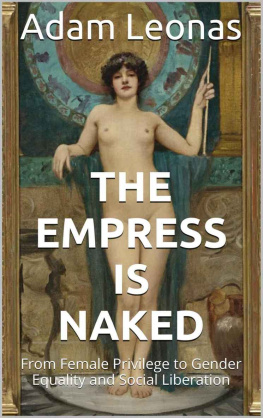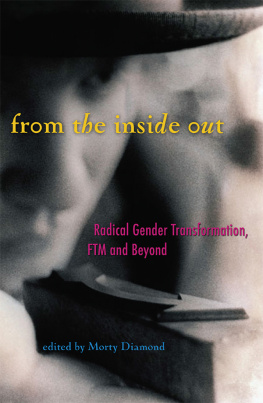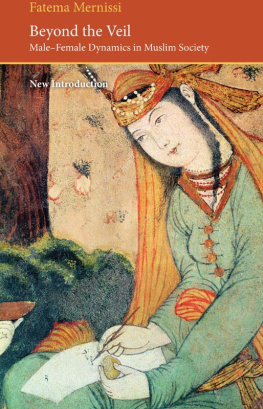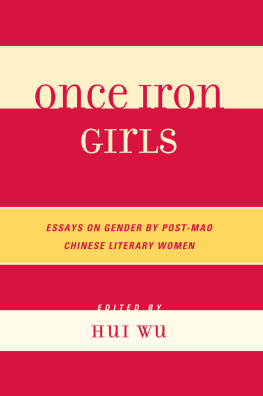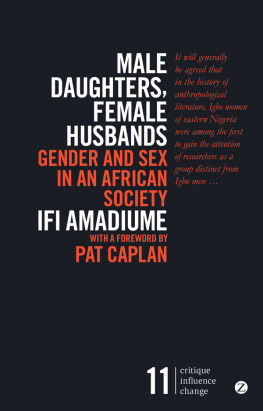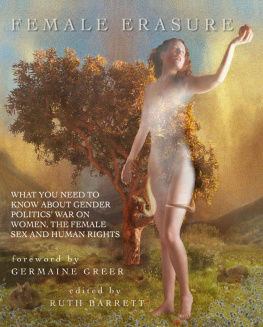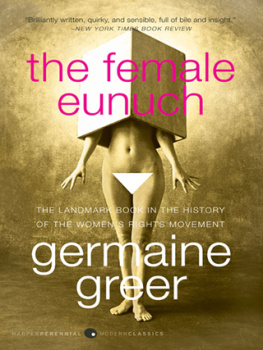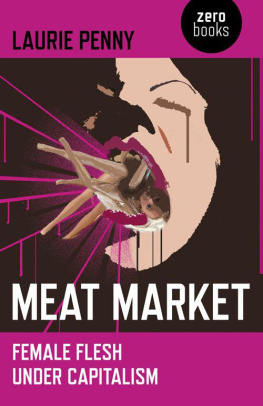Adam Leonas
The Empress Is Naked
From female privilege to gender equality and social liberation
Version 1.0.1
2015
2015 Adam Leonas
Version 1.0.1
The author hereby allows quoting limited excerpts from this book in blogs, books and any other media, for criticism and discussion.
Quotes from other sources are copyright of the respective authors and publishers.
TheEmpressIsNaked.wordpress.com
Introduction
[T]he first class oppression coincides with that of the female sex by the male, wrote Engels in 1884. Since then, women's inferior position has been considered an undeniable fact, especially by progressive thinkers. Different political traditions have different viewpoints on the issue, but two of them stand out: Left Feminism which advocates that women are oppressed by Capitalism, and therefore that they will be liberated by overturning it; and Radical Feminism which argues that women are oppressed by Patriarchy, which is a complex set of prejudices, beliefs and institutions that result in men generally benefiting against women, which meant that the struggle should be against male privilege.
Radical Feminism is mainstream
The most interesting phenomenon is that the ideation of a Patriarchy has essentially been adopted by the system. Throughout the Western world, the concept of an oppressive patriarchy, as expressed by politicians, journalists and academics, is a key component of the dominant ideology. It is quite difficult to express a different view without being scorned, mocked, and subjected to fierce attack.
Time Magazine characteristically attacks the Men 's Rights Movement with these words: Imagine a kid who got a cone with three scoops of ice cream in it. Good flavors, too. Like peanut-butter chocolate, plus a scoop of cookie dough. In a waffle cone. And then this child whines about the lack of chocolate sprinkles on top. Welcome to the mens rights movement. [I]ts overwhelmingly a toxic slew of misogyny.
When Doris Lessing, an emblematic figure of feminism, attacked the unthinking and automatic rubbishing of men which is now so part of our culture that it is hardly even noticed, BBC felt obliged to fill its reporting article with the answer of a typical feminist. This is a very mild case of the typical censorship against any statements that are sympathetic to men. It goes without saying that there is no counterargument to statements that take women's oppression for granted.
An example from the Washington Post is quite representative of the way reality is distorted when it comes to gender issues. One article was titled Study: Black girls suspended at higher rates than most boys. The author had chosen Wisconsin as an example, where 21 percent of black girls are suspended, compared with 14 percent of black boys, 6 percent of white boys and 2 percent of white girls. She also stated that In the Washington, D.C., black girls are suspended at 13 percent, and white boys are suspended at 12 percent. But she couldn't actually bury the overall findings, which showed that Overall, black boys are more likely to be suspended than any group, at 20 percent. Black girls are at 12%. White boys are at 6%, while white girls at 2%. Instead of being titled Boys are suspended more than girls, and blacks more than whites, the article's Goebbelian selection of title and emphasis are clearly more consistent with a feminist alteration of reality.
It is a fact that Media and courts treat women like delicate little flowers instead of full human beings and thus fully capable of evil actions. In a Canadian research about the way newspapers describe the mentally ill, researchers concluded that the chivalry hypothesis holds [...] after examining 1,168 newspaper articles published over six months: These articles more frequently portrayed women compassionately as victims of circumstances or passions beyond their control. However, this kind of background information was routinely lacking in articles about men, who were routinely portrayed in a more dismissive and contemptuous manner [P]ortrayals of women appear to be more sympathetic and considered; more frequently being portrayed as sad.
The extent to which radical feminism is mainstream is highlighted by the fact that the most popular feminist in the US today is Hillary Clinton, a politician belonging to the core of the Establishment. She has been able to make extensive use of the pro-feminist bias in the American political scene and the media in order to propel her political career.
Another issue that highlights radical feminism's conventionality is the pervasiveness of its academic expression, Women's Studies, in education. By the mid-1970s, there were at least eighty Women's Studies programs across the United States.... There are now ... more than 500 Women's Studies Departments around the world.
Women's oppression: Systemic views
There are many studies on how women are oppressed at work, in the family, in sexual relationships an so on. And it's beyond doubt that women are indeed oppressed. But are they more oppressed than men? Are they oppressed as women , or as members of a specific social class?
Systemic views cannot admit that men are also oppressed because that would be admitting that the system itself is oppressive. These views don't mind, however, assigning to women the status of victims, to which they themselves pretend, along with the positive discrimination that this entails such as alimony, early retirement, a milder treatment by the courts, exemption from the military service and more. The practical result is that the system facilitates women's lives in several ways, while men, especially those from lower social classes, have to struggle for everything, and are never given a break.
Left Feminism
For those in the Left it is almost self-evident that the women's cause should be supported. The Classics have said so, the feminists are shouting, and since the Left feels compelled to side with whomever protests against the system, the choice is made. Paradocixally, however, the Left feminist approach has been formulated... by men. It was Lenin himself who described Socialism as the system where every cook-maid can govern. The Left's vision of female liberation seeks a woman who can live as a man. But it forgot to ask women whether that was what they wanted.
Research in Great Britain found that 6 out of 7 women explicitly claim that they are not feminists, despite the blatant pro-feminist bias in the media. One reason for this rejection of feminism is its outright hostility to men, something that most women are not prepared to accept at least at its explicit manifestation. The other reason is that women have begun to realize that the male world, i.e. the world of wage and compulsory labor are not as rosy as promised, and that the traditional female role may not be so bad after all...
Revisiting our convictions
Feminism has been around for almost two centuries and three waves. All its initial goals at the institutional level have been met. Women have the right to vote. Their position before the law is not only that of men's equal, they are favorable compared to men, particularly with regard to marriage, divorce, property, and of course child custody. In the Western world, the right to abortion has been won.
And yet women still have a different position in society than men. Is it worse? Or could it be better ? Could it be that this difference is to women's advantage? Feminist Germaine Greer holds that their different position is largely their choice: The old suffragettes served their prison term [and] lived on through the years of gradual admission of women into professions which they declined to follow, into parliamentary freedoms which they declined to exercise, into academies which they used more and more as shops where they could take out degrees while waiting to get married...
Next page
